intouch
Autumn / Winter 2025
Page 5
Peer Support Facilitator
Marianne wins
MS Australia award
Page 10
A carers experience of MS
Page 12
Symptom spotlight: bladder and bowel management



Autumn / Winter 2025
Page 5
Peer Support Facilitator
Marianne wins
MS Australia award
Page 10
A carers experience of MS
Page 12
Symptom spotlight: bladder and bowel management


John Blewonski | Chief Executive Officer
Welcome to your first Intouch magazine for 2025.
These past few months have certainly been an exciting and busy time for MS Plus. Back in November, I had an incredible day at Lang Park in Wollongong, the finish line for this year’s Gong Ride.
It was a joy to share the experience with 6,500 riders who journeyed down from Sydney, along with enthusiastic family members, friendly locals, our amazing volunteer crew — all managing to raise an impressive $1.3 million for people living with MS.
We’ll be preparing for our 2026 Gong Ride soon and we would love you to join, so keep an eye on the website.
We then kicked off the first of our legacy Mega Challenge events with the Fitzroy swim in February, which raised more than $128,000!
This year we are delivering our Walk, Run + Roll events a little differently, spreading individual state events out between March and May, to make sure everyone has a chance to get involved!
We have just wrapped up another successful Sydney event, with Launceston not far behind on Sunday 6 April. There is still plenty of time to sign up and for our Canberra run on Sunday 4 May and Melbourne run on Sunday 18 May.
Perhaps the biggest event on our calendar this year has been
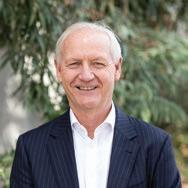
the launch of our state-of-theart Lidcombe Wellbeing Centre, including our hotel-style long and short-term supported accommodation.
The new centre represents our growing commitment to supporting our broader neurological community and those aged over 65.
Our Strategic Directions 2020–2025 will have run its course in July 2025, and recently the MS Plus Board and myself reviewed our progress and achievements against the plan and I acknowledge our dedicated staff in helping the organisation to achieve the many milestones laid out in this plan over the past five years. We will now begin work on our Strategic Directions 2025–2027, with careful consideration be given to the following:
y Ongoing organisational Sustainability y Service growth and Development
y Opportunities to drive and support Innovation
y A focus on Partnerships
y The importance of our People I look forward to shaping these goals in the coming months and delivering on these aspirations in the coming years – to the benefit of all those living with neurological conditions and our over 65s community.
Disclaimer: Information and articles contained in Intouch are intended to provide useful and accurate information of a general nature for the reader but are not intended to be a substitute for legal or medical advice. MS Plus is not recommending medical or legal advice and readers must seek their own as may be appropriate.
Advertising disclaimer: MS Plus does not endorse any one product or service over another, nor do we receive any commission on sale of items. Consumers are encouraged to discuss the options for exchange or return at the time of purchase with a specific supplier because MS Plus is not liable in the event the product is not satisfactory.
117 Denison Street, Deakin ACT 2600
Betty Cuthbert Drive, Lidcombe NSW 2141
246 Murray Street, Hobart 7000 VIC 54 Railway Road, Blackburn VIC 3130 Plus Connect: 1800 042 138 (free call) 8:00am – 5:00pm weekdays
If you need an interpreter, you can call the Telephone Interpreter Service (TIS) on 131 450 or visit tisnational.gov.au
Regional offices: msplus.org.au/contact-us
© MS Plus 2025 facebook.com/wearemsplus linkedin.com/company/wearemsplus youtube.com/c/wearemsplus instagram.com/wearemsplus










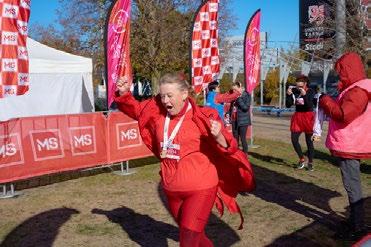


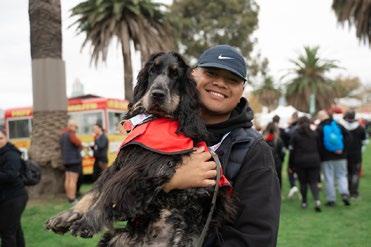

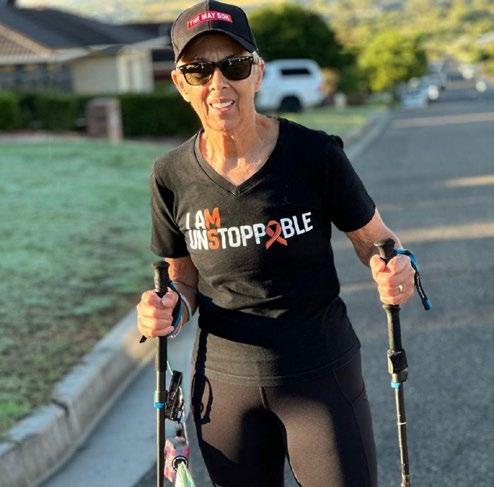
Congratulations to our very own Marianne Gaul AM, retired nurse and dedicated MS advocate who facilitates peer support networks for people living with MS across Tamworth and western NSW.
Marianne is this year’s MS Australia MS Advocacy Award winner, in recognition of her lasting impact on the MS community.
The MS Australia Awards recognise people who raise awareness about MS and champion the needs of those living with the condition.
MS Australia CEO Rohan Greenland praised Marianne’s selfless dedication to the MS community, recognising her invaluable support to others living with the condition.
“Marianne embodies the true spirit of advocacy. Her dedication to peer support, fundraising, and community leadership has made a real and lasting difference to so many lives.”
Diagnosed with MS in 2007 at the peak of her 45-year nursing career, Marianne faced her condition with the same commitment to care and service that defined her
“At that time, I was employed as a Clinical Nurse Consultant for Rural Emergency Care, a position I held for 25 years, supporting clinicians in 20 rural hospitals in northern NSW,”
Marianne retired in 2013 after a career devoted to improving rural healthcare and was made a Member of the Order of Australia (AM) for her services to nursing. However, her commitment to helping others didn’t end with her professional career.
She found fulfilment in volunteering — spending 10 years with a local Lions Club before joining MS Plus Peer Support, where she was inspired by her own experience with MS to support others facing similar challenges.
As a Peer Support Facilitator, Marianne oversees group peer support sessions, provides individual telephone support, and leads volunteer catch-ups, ensuring people with MS receive emotional and practical assistance while fostering collaboration among the team of volunteers.
“My passion is supporting people living with MS,” Marianne said.
“I find much gratitude and satisfaction in facilitating groups, offering one-on-one support, and helping people navigate the challenges of living with MS.”
Of her many accomplishments, Marianne is most proud of the meaningful connections she has built within the MS community.
“It’s very rewarding to see what a difference you can make to people’s
lives through monthly meetings a friendly phone call, or a card that acknowledges a special occasion such as a birthday or becoming a grandparent,” she said.
In 2024, MS Australia expanded its annual awards program, introducing two new awards open to public nomination, the MS Research Award and the MS Advocate Award.
These awards complement the program’s legacy of celebrating outstanding service through the prestigious John Studdy Award.
This year’s other award recipients include:
MS Research Award: Professor Jeannette Lechner-Scott, Newcastle, NSW
Professor Lechner-Scott is a globally recognised leader in MS research and MS Plus Board Member, with decades of groundbreaking work spanning disease mechanisms, biomarkers, and clinical trials. Her current studies, including the impact of pregnancy on MS, continue to inform treatment strategies and improve patient care.
John Studdy Award: Lynda Whitton, Bunbury, WA
Lynda has dedicated three decades to advocacy, leadership, and fundraising in the MS community. As President of the Bunbury Outreach Group and founder of the Bunbury Swim fundraising event, she has made a profound difference in Western Australia and beyond, helping to establish vital support networks and services.

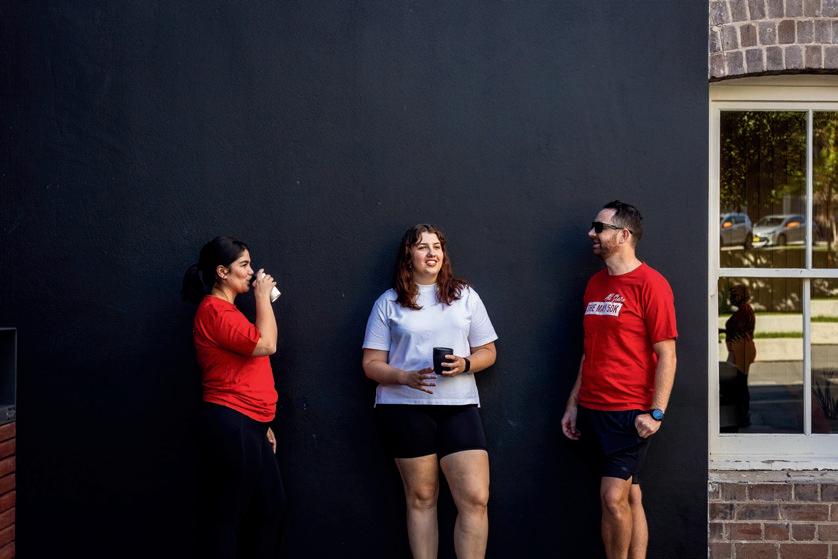
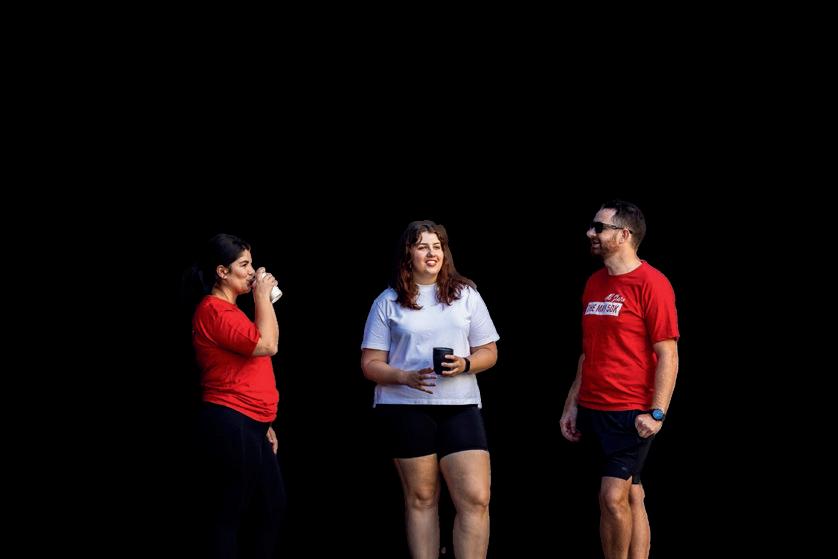

Plan ahead: what you need to know about decision making in older age
Tuesday 29 April, 9:30am–11:00am
Lidcombe Wellbeing Centre, refreshments provided
There are steps you can take to ensure that decisions made on your behalf are the right ones for you. Join Seniors Rights Service to better understand your rights, the opportunities for pre-planning and where to find more help. Register now.



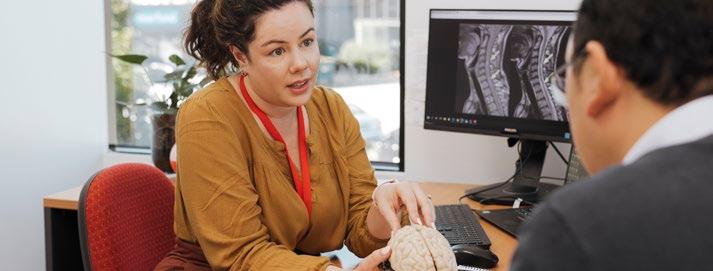
Q: I’ve just been diagnosed with MS. How do I choose the right treatment?
A: Choosing a treatment for MS can feel overwhelming. There’s a lot to take in, and decisions often need to be made quickly. It’s completely normal to feel unsure. A good place to start is by talking with your neurologist, MS clinic, or MS nurse. They can help you understand your options and what might be the best fit for you.
One way to approach this decision is to think about how you want your MS to be in the future. Do you want to minimise its impact on your daily life? Reduce the risk of disability
Q: I experience fatigue, wouldn’t exercise make this worse?
A: Not quite. With any type of increase in activity there may be an initial increase in fatigue levels for some. The key to overcoming this and eventually reducing the overall impact of MS symptoms such as fatigue is repetition and consistency. The benefits of working alongside a neuroexperienced exercise physiologist is that we are uniquely qualified and experienced in assisting you navigating your fatigue whilst increasing your activity levels.
We can:
y assess your personal level of cardiovascular fitness/flexibility and strength
progression? Once you have a sense of that, you can look at which treatments are most closely aligned with achieving that outcome.
We know from research that starting treatment early—particularly with a highly effective option—can lead to better long-term outcomes. Your neurologist will usually recommend what they believe is the most appropriate treatment for you, based on the latest evidence. Sometimes, they’ll offer a few options but highlight the one they feel is the best choice.
Efficacy is usually the main consideration when choosing a treatment. Beyond that, you might
also want to think about practical factors, like whether a tablet, injection, or infusion suits you best, and which potential side effects feel most manageable.
It’s a big decision, and there’s a lot to wrap your head around in a short time. Asking questions and getting the right information can help you feel more confident. If you’d like to talk things through, our MS Nurse Advisors offer free 45-minute phone appointments to provide extra support. We’re here to help every step of the way.
Phone Plus Connect 1800 042 138 or email connect@msplus.org.au
y understand what triggers your fatigue and if there are times of the day/seasons (i.e. summer) that tend to make this worse
y assist in improving tolerance to exercise duration and intensity
y employ tailored cardio and strength training routines
y ensure you rest and recover adequately afterwards
Your EP will work with you to ensure you are able to enjoy all the benefits of exercise in managing your neuro symptoms.
Find out more about how EP can help you manage your symptoms msplus.org.au/ ExercisePhysiology


A FREE online course to enhance understanding of mental health and its interaction with anxiety, depression and MS.
Duration: self-paced
Effort: 1.5-2 hours per module
Completion certificate: Yes
The course consists of three modules. On successful completion you will be able to:
y Explain what mental health is and how it differs from mental illness
y Describe the symptoms and early signs of anxiety and depression
y Explain the relationship between MS and anxiety and depression
y Describe some strategies for improving or maintaining mental health.
This course was developed by the MS Research Flagship, Menzies Institute for Medical Research at the University of Tasmania in collaboration with the MS community and the Wicking Dementia Research and Education Centre.

Funding for the course development has been provided by the Australian Government.
Enrol today.
A fatty acid is a building block of fats. It’s a type of molecule that combines with others to form the fats found in our food and bodies.
Think of it like a small piece of a puzzle that, when put together with other pieces, makes up the whole picture of a fat molecule.
Fats made up of polyunsaturated fatty acids (PUFAs) are found in many plant-based oils (such as seed and nut oils) and in fish oils.
PUFAs include omega-6 fatty acids and omega-3 fatty acids. Both types of PUFAs have anti-inflammatory properties. As MS is an inflammatory disease, both omega-3 and omega-6 PUFAs may be able to reduce the risk of MS onset or slow its progression.
Examples of foods high in omega-6 fatty acids include safflower, sunflower and canola oils, tofu, walnuts and almonds.
Examples of foods high in omega-3 fatty acids include flaxseeds, chia seeds, walnuts, soybeans and oily fish.
What did researchers find?
MS Australia-supported

researchers, including Dr Eleanor Dunlop and Associate Professor Lucinda Black, analysed the fatty acid profiles of blood samples taken from 589 people diagnosed with MS or clinically isolated syndrome (CIS), and 630 people without MS.
They found having a higher total level of omega-6 PUFAs may be helpful in reducing the risk of developing MS. This suggests that including foods rich in omega-6 PUFAs in a diet is beneficial.
However, more study is needed to determine whether higher levels of omega-3 PUFAs would lower the risk of developing MS.
MS Australia recommends that people with and without MS follow the Australian Guide to Healthy Eating, which is also detailed in the Adapting Your Lifestyle Guide.
This guide, developed by MS Australia in collaboration with national experts and people affected by MS, provides practical recommendations for evidencebased lifestyle changes that may benefit aspects of MS, including relapses, disability, and other symptoms, and improve overall quality of life.
Read the full article.

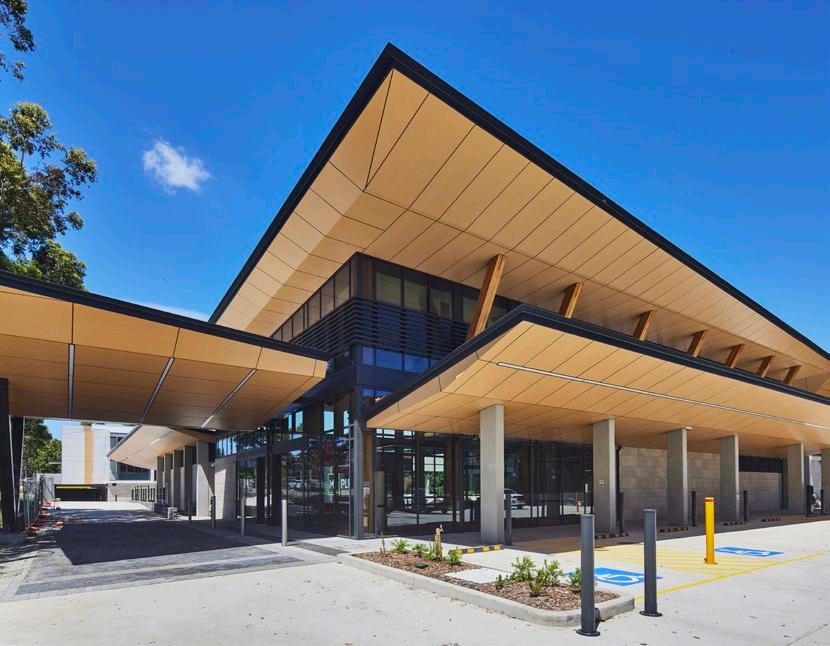
A new era in neuro wellbeing and healthy ageing begins!
It was heartwarming to see so many of our clients, staff and local healthcare community come together in February for our special Lidcombe Wellbeing Centre pre-launch event!
Clients, together with local health providers, were able to tour the incredible new facility, including our hotel-style high physical support needs long term and respite accommodation, meet our staff and learn more about the services we offer to support healthy ageing and those living with a broad range of neurological conditions.
Our network of NSW health professionals then joined us for
a special neuro education session, featuring an incredible panel of experts: Neurologist Dr Justin Garber, Geriatrician & CMO, Dr Des Graham, Neuro Physiotherapist Dr Phu Hoang and Disability Employment Specialist Jeffrey Lawrence. Thank you to our panel for their incredible insights. The group’s discussion on the benefits and challenges of integrated care for neurological clients was an important step to progressing neuro patient outcomes through a multidisciplinary approach.
The session also highlighted the power of preventative healthcare as we age, shifting the focus to
wellbeing and early intervention to minimise the need for acute care — to improve quality of life for over 65s.
Of course, a warm thank you to everyone who came along throughout the day. A special shout out to our regional clients — with some travelling from up to four hours away to attend! The event was truly a celebration of the power of community and collaboration. The official centre launch was held on 5 March, as a thank you to all our supporters, who made the Lidcombe Wellbeing Centre a reality.
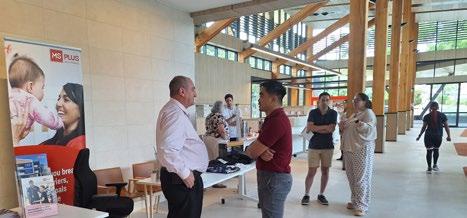
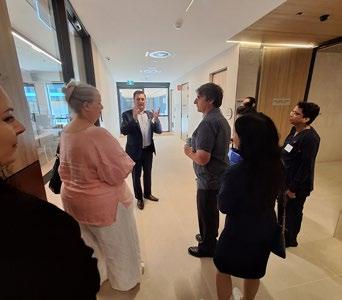

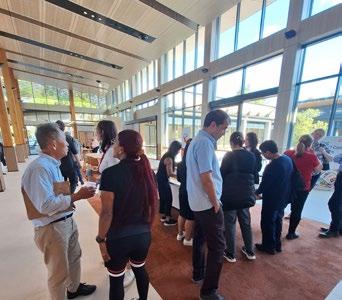
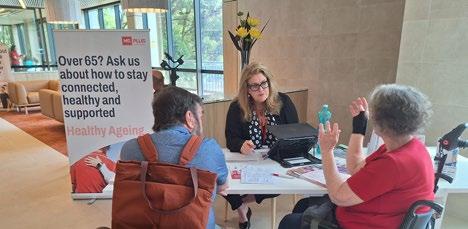
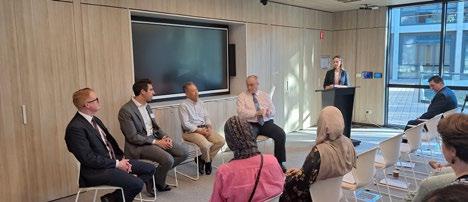
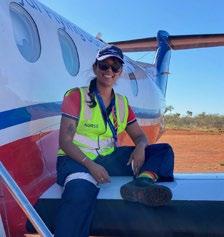
In 2015, 21-year-old Cass David was working in a Melbourne dental clinic and considering a career in nursing. But then, she began to feel unwell.
"It started with headaches, and then my speech changed. My motor skills deteriorated next. I struggled to play my guitar," she recalls.
"The maxillofacial surgeon I worked with at the clinic told me to get an MRI. I did, and soon found out I had MS."
Cass tried to stay positive.
"Negativity and anger drain your energy and push people away. We all face challenges, and I thought, this is mine, but I’ll do my best to manage it."
Her best meant pursuing her nursing degree and using her experience to help others.
While Cass doesn’t usually share her diagnosis with patients, she knows that her dual role as a patient and a nurse gives her a unique perspective on pain management and resilience.
In the early stages, Cass’s MS was aggressive, leading to frequent hospital stays. But thanks to new medications and self-care measures like a good diet, aerial yoga, massage and osteopathy, her condition improved.
In 2021, Cass and her partner moved to Alice Springs for "the adventure of a lifetime."
She became a flight nurse with the Royal Flying Doctors Service, flying thousands of kilometres across Australia to provide urgent care to patients in remote communities.
"You see everything from farm accidents and heart attacks to snakebites," she says.
Cass also works as an emergency care nurse at Alice Springs Hospital.
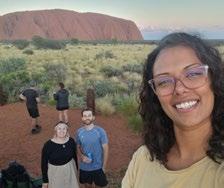
“I wanted to experience intense nursing now before my condition might limit me. Many people in rural communities have complex health issues, and you encounter conditions here that aren’t as common in metropolitan settings. It’s been invaluable learning,” she explains.
Throughout her MS journey, Cass has received support from MS Plus. The team helped her understand her condition, navigate the NDIS for equipment and connect with others living with MS.
Grateful for their assistance, Cass, now 30, has regularly donated to MS Plus. Recently, she took her commitment a step further by leaving a gift to MS Plus in her Will.
"I’ve received so much help from MS Plus. The research and services they provide wouldn’t be possible without funding. My gift can go
where it’s most needed," she says.
Cass used Gathered Here, free online will-writing service and said it was easy to include a charity.
"It was straightforward. I’m happy knowing that my contribution will help others in the future.”
Cass’s journey with MS hasn’t been easy, but she remains optimistic.
"I’ve come a long way in 10 years. I lug a 25-kilo ventilator every time I get on a plane, but I can do it. I’m fortunate to be in a better place now, but I know not everyone with MS is as lucky. I don’t take anything for granted. I want to live life to the fullest, and I want that for others, too."
Could you be like Cass? By including a gift of any size in your Will, you can leave a legacy of your own values. This way you can help MS Plus continue its vital work for a cure, better treatments and expanded services for people living with MS. Cass is now a member of the MS Callistemon League, a group of extraordinary people who are leaving a legacy of kindness, care, and ultimately – transformation.
For more information, contact Laura Henschke at 1800 443 867, email futureplanning@msplus. org.au or visit mymslegacy.org.au
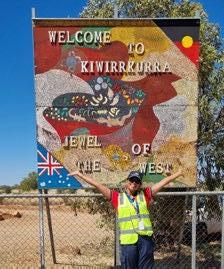
EBV infection is common, affecting around 90 per cent of adults globally. However, it is almost universal in people with MS.
A landmark study in 2022 provided the strongest evidence yet that infection with EBV is necessary to develop MS. Among 10 million US military personnel monitored over many years, MS only developed in those who had been infected with EBV. Signs of nerve damage appeared several years prior to MS onset, but only after EBV infection.
In MS, the immune system mistakenly attacks the insulating layer of myelin that surrounds nerve cells in the brain, spinal cord and optic nerve. There are several theories on the role of EBV in the development of MS. One theory suggests that the body’s immune attack against EBV also mistakenly targets the brain and spinal cord.
It is not clear yet whether EBV simply acts as an initial trigger for MS, or whether it continues to drive disease activity following the onset of MS.
However, a growing body of evidence suggests that chronic EBV infection of B cells, a type of immune cell, might be a driver of chronic symptoms in MS, such as fatigue.
In Australia and globally, scientists are investigating various strategies to target EBV in MS. These include antiviral medications, vaccines, and cell therapies.
Antiviral drugs work by preventing viruses from making more copies of themselves (replicating). However, they don’t completely eliminate the virus from the body.
If EBV is driving ongoing disease activity in MS, the hope is that using antivirals to stop EBV replicating might help suppress MS activity.
The development of new drugs is an expensive process with long lead times.
An alternative strategy is to “repurpose” existing drugs. That is, to take drugs that are already
approved for other uses and test them for effectiveness in a new condition.
This can bring new therapies to the clinic much more quickly, because much of the safety testing has already been done, and there is often a better understanding of the drug’s target effects and side effects.
Aspirin is one example of a drug that has been repurposed, where itz can be used as a treatment for pain and inflammation, as well as cardiovascular disorders.
Despite EBV being such a common virus, there are currently no approved antiviral treatments for EBV infection in Australia.
However, antivirals used to treat other viruses are known to suppress EBV activity, both in the laboratory and in human clinical trials, offering hope.
Read the full article.


Reality: Bladder and bowel issues are common in MS, regardless of age or stage. It’s not just about getting older, other factors like MS progression, health and lifestyle matter too.
The Plus Continence service can help you to manage your symptoms and improve your quality of life. Head to msplus.org.au/pluscontinence
“Incontinence involves bladder and bowel dysfunction. Early detection through education and self-awareness is essential, especially for people living with MS. Understanding the impact of incontinence can also help individuals improve bladder and bowel health.
Cathryn, MS Plus Continence Nurse
Upcoming employment support sessions, new sessions added each month, FREE, live online:
Working with a chronic condition: tips to staying employed
Wednesday 9 April, 6:00pm–7:30pm
Join our employment experts who will share practical advice to help you navigate the challenges of work while managing a chronic condition. there are many benefits to remaining in employment beyond the financial benefits. Learn strategies for maintaining your career while managing your condition to help you stay working.
To register for an upcoming session, visit msplus.org.au/education
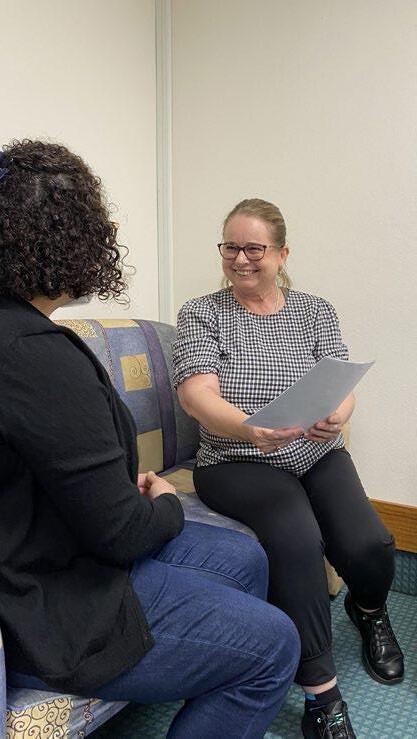
Q: Can I get help with household tasks?
A: Yes! If household tasks are included in your NDIS plan under Support Category 1 [Assistance with Daily Living].
This can help to cover cleaning, laundry, grocery shopping and gardening. If it’s not specifically included, you may still be able to access support through your core funding to assists with tasks around the home.
If you’re feeling overwhelmed with the latest NDIS changes, our support coordinators and plan management services can help.
Get in touch today, phone 1800 042 138, email connect@msplus.org.au or visit msplus.org.au/ support-services/ndis-services
y Your gut is a key player in your mood: the gut produces around 95% of the body’s serotonin, the “feelgood” neurotransmitter.
y So, gut health is directly tied to your mental health, potentially influencing mood disorders like anxiety and depression.
y Fermented foods are gut friendly: probiotic foods like kefir and yoghurts with active and live cultures (good bacteria) can also support a healthy gut.
y Gut health impacts immune function: about 70-80% of your immune system is housed in your gut.
y A healthy gut plays a major role in protecting you from infections and autoimmune diseases.
y Diverse diet = diverse microbiome: eating a wide variety of plant-based foods (fruits, vegetables, whole grains) helps promote a diverse microbiome. A diverse gut microbiome is linked to better digestion, immunity, and even a lower risk of chronic diseases.
Weakness and lack of coordination in the muscles of the neck, mouth, cheeks and throat can interrupt the complex process of swallowing.
The messages in the brain that trigger the swallowing response can also be affected in MS. As a result, MS can cause dysphagia (difficulty swallowing). What should you do if you experience swallowing problems?
If you’re having difficulty swallowing, talk to your GP, MS nurse or neurologist. They can give you advice and may refer you to an allied health specialist, such as a speech pathologist.
How to swallow safely
y Take your time when eating — take smaller bites and concentrate on chewing and swallowing.
y Sip on drinks slowly throughout your meal and if you have any food lodged in your throat.
y Eat smaller meals more often or have your largest meal when you have the most energy.

y Use good posture while you sit to make it easier to swallow.
y Be aware of foods that are harder to eat and may cause swallowing issues, such as dry food, crumbly textures or thin liquids that go down quickly.
y Relax and avoid speaking while you eat.
y Stay upright for at least 20 minutes after eating.
y Make sure your mouth is empty before continuing to eat or drink.
y If you are having difficulties swallowing, don’t hesitate to seek further care from a medical professional, as choking can be life threatening. In case of an emergency call 000.
Find out more msplus.org.au/ swallowingandspeech

&
Three week program starting Tuesday 6 May (6, 13 and 20 May), 10:00am–11:30am, refreshments provided
Brain health is as important as physical wellbeing. Join our Active & Well over 65 program and learn about how you can improve both your brain and physical health, explore practical tips to enhance wellbeing, and build connections with like minded peers. Health professionals will join you each week to give you tips and answer questions. Register now.



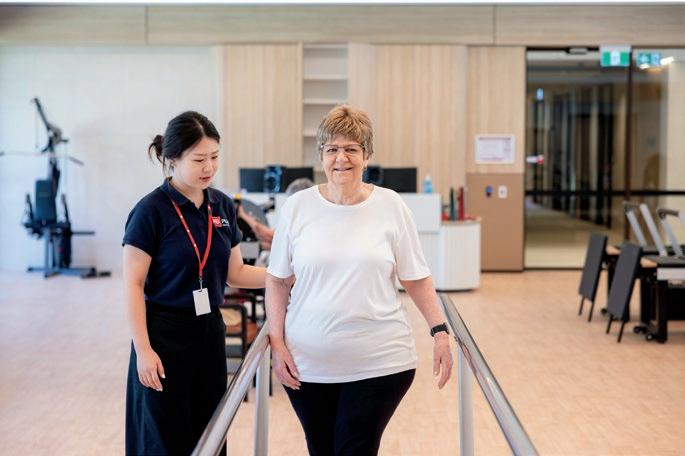
New over 65s Peer Support Group now meeting at Lidcombe Wellbeing Centre
This is a great chance to meet and connect with others living with MS and other neurological conditions at our amazing new Lidcombe Wellbeing Centre!
The group will meet on the last Tuesday of every month from 10:30am–12:30pm, 80 Betty Cuthbert Drive, Lidcombe.
A great opportunity to check out the new centre and connect with other MS Plus support services while you’re there!
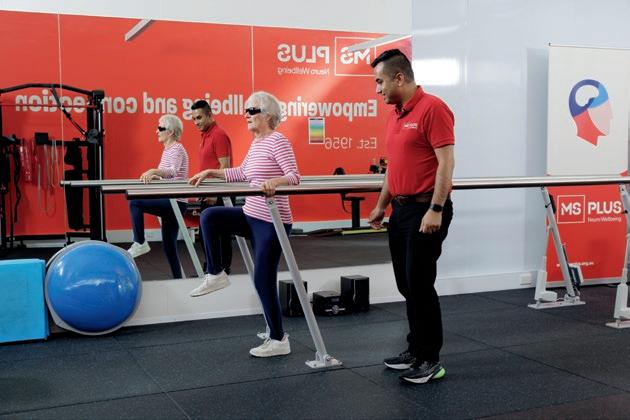
Register for an upcoming program today at msplus.org.au/programs
MS Plus Navigate Series: Family & Friends
Over two 75-minute sessions, an MS expert will guide discussions, provide information, links to resources and answer any questions you may have.
The sessions will be facilitated by an MS Nurse and cover topics such as understanding MS, navigating the health system, where to access support and how to look after yourself while supporting someone else.
Dates:
Various dates available.
Navigate Series: Newly Diagnosed
The online 90-minute sessions run weekly over five weeks. Each session will include expert content, an opportunity to learn from others experiences and a chance to ask questions.
The sessions will be facilitated by our nurse advisor team.
Dates:
Various dates available.
Upskill NDIS provides you with an overview of the National Disability Insurance Scheme (NDIS), so that you can be more confident in your decision to apply.
Our team has supported people throughout their NDIS access journey since 2016. They bring extensive experience and expertise of the ever-changing NDIS landscape.
To book, phone Plus
Connect 1800 042 138
Plus Boxing
Fridays 9am–10:30am
80 Betty Cuthbert Dr, Lidcombe
Lidcombe Yoga (Chair based)
Wednesdays 10:15am
80 Betty Cuthbert Dr, Lidcombe
Dance for Health (independent and chair based)
Mondays 10:30am
80 Betty Cuthbert Dr, Lidcombe
Marrickville Yoga (independent)
Tuesdays 9:00am
Addison Road Community Centre, 142 Addison Road, Marrickville
To book, phone 1800 042 138
Be better balanced Tuesdays 9:30am (circuit-based class) Thursdays 10am (chair-based class)
Gloria McKerrow House
117 Denison St, Deakin
Cost: $13 per session: min purchase of 10 session class pass for $130
This 40-minute online lunchtime session will cover:
y who and what is the NDIA and NDIS?
y explanation of common terminology
y what is a diagnosis vs disability?
y what evidence is required when you apply?
Dates:
FREE day and evening sessions are available throughout the year.
Fatigue management for MS
6 x 90 minute weekly sessions.
Whether you’re trying to keep up with the kids, ease fatigue at work or want to get more out of your day, FACETS provides practical strategies and approaches. Participants must be MS Plus clients (free registration), have a MS diagnosis and a minimum level of mobility.
Wheels in motion (chair-based class)
Thursdays 11:00am
Gloria McKerrow House, 117 Denison St, Deakin
Cost: $13 per session, min purchase of 10 session class pass for $130
For queries relating to exercise groups in Blackburn, please call Plus Connect 1800 042 138

Services to support and improve your quality of life
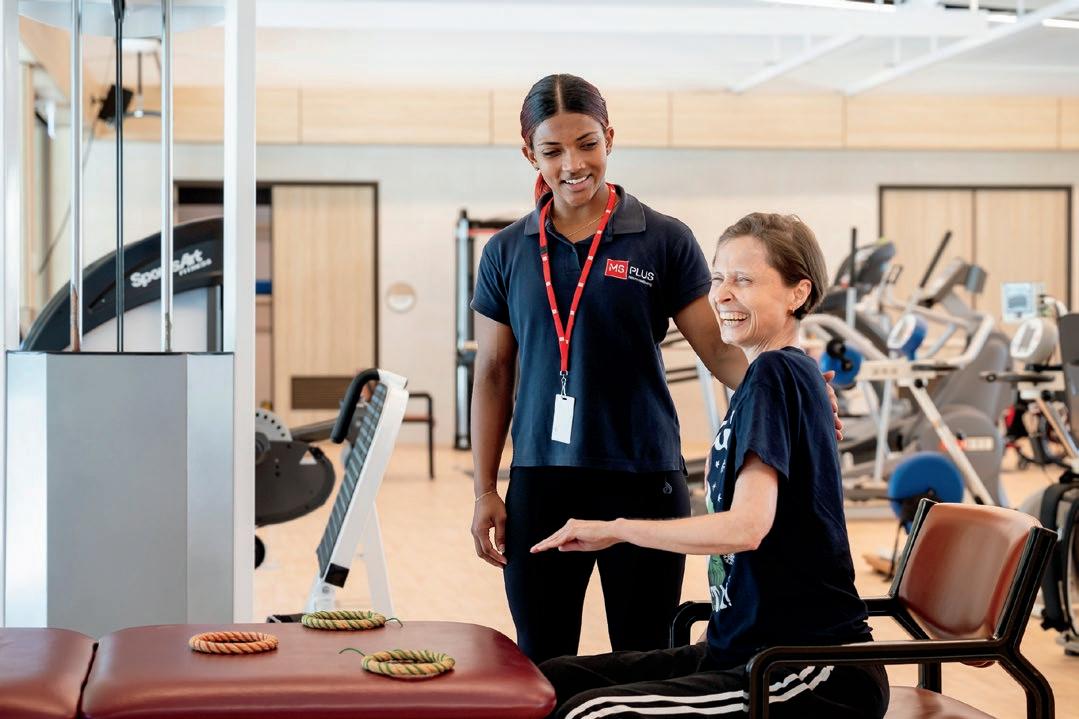



improve balance / reduce falls risk
fatigue management
weakness / spasticity
improved bowel and bladder health
supported healthy ageing
optimal nutrition
Maintain an active lifestyle with the help of our Physiotherapists, Exercise Physiologists, Dietitians, Occupational Therapists and Continence Nurses
